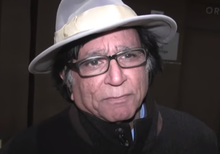Ibn Warraq
Ibn Warraq ( Arabic ابن وراق, DMG Ibn Warrāq ) is a pseudonym traditionally adopted by critical thinkers in Islam . Today an author works under this pseudonym (* 1946 in Rajkot , India ) who turned away from Islam as an apostate . He achieved notoriety with his call for a " cold war " by the " enlightened " against Islam.
Life
Ibn Warraq was not raised religiously in his childhood. His father would have liked to become a writer, but had to become a businessman.
Ibn Warraq always felt like a skeptic, but as a young man had an identity crisis in which he briefly opened up to Islam. In the end, however, skepticism prevailed and he turned to philosophers such as Baruch Spinoza , Immanuel Kant , Gottfried Wilhelm Leibniz and David Hume .
Ibn Warraq studied at the University of Edinburgh with the orientalist William Montgomery Watt .
In 1993 he began appalled by the reactions of Western intellectuals to the death fatwa of Ayatollah Khomeini against the writer Salman Rushdie , with the work on his book Why I Am Not a Muslim (the title is based on Bertrand Russell's book Why I am not a Christian am on). When it came out in 1995, he was Professor of British and American Culture in Toulouse . Fearing to become a second Salman Rushdie, he took the pseudonym Ibn Warraq and even kept it a secret from his family.
Act
In his books, Ibn Warraq openly criticizes Islam and the reactions of the Western world to Islamic legitimacy and practices that violate human rights. He accuses western intellectuals of not being able to "defend the precious good of freedom".
A key demand of Ibn Warraq is the Cold War of the enlightened against Islam , which he considers to be misleading to distinguish it from Islamism , because Islam is not a peaceful religion (in contrast to Muslims). For example, the Koran contains demands that men should be allowed to beat their wives. This is an expression of the fact that it cannot be interpreted liberally, but must be questioned as such. A "hot war" against Islam could not be won.
Ibn Warraq differentiates between three “layers of Islam”: the Koran, interpretation by the theologians and daily practice - “that was mostly more liberal and tolerant than what the scribes wanted to convey to us”.
He is often quoted by the American religious scholar Robert Spencer .
He is one of the signatories of the Manifesto of the 12 against Islamism as a "new totalitarian threat".
Ibn Warraq names, following Sebastian Gorka, four Islamic authors who have most strongly influenced the ideology of martial Islamism, jihadism, with their main writings:
“ Sayyid Qutb ’s Milestones ; Abdallah Yusuf Azzam ’s The Defense of Muslim Lands ; Ayman al-Zawahiri ’s Knights under the Prophet's Banner ; and Brigadier SK Malik 's The Quranic Concept of Power. "
Works
- The use of historical methods and the demand for goodwill towards Islam . In: Markus Groß , Karl-Heinz Ohlig (Hrsg.): The emergence of a world religion I. From the Koranic movement to early Islam. Schiler, Berlin 2010, ISBN 978-3-89930-318-6 .
- Defending the West: A Critique of Edward Said 's Orientalism . Prometheus Books, 2007, ISBN 1-59102-484-6
- Why I Am Not a Muslim . Prometheus Books, 1995, ISBN 0-87975-984-4
- Why I am not a Muslim (together with Taslima Nasreen ), Matthes & Seitz Berlin, Berlin 2004, ISBN 3-88221-838-X
- as editor: Which Koran ?: Variants, Manuscripts, And the Influence of Pre-islamic Poetry. Prometheus Books, 2007, ISBN 1-59102-429-3
- as editor: Leaving Islam: Apostates Speak Out . Prometheus Books, 2003, ISBN 1-59102-068-9
- as editor and translator: What the Koran Really Says: Language, Text, and Commentary . Prometheus Books, 2002, ISBN 1-57392-945-X
- as editor and translator: Quest for the Historical Muhammed . Prometheus Books, 2000, ISBN 1-57392-787-2
- as editor: Origins of the Koran: Classic Essays on Islam's Holy Book . Prometheus Books, 1998, ISBN 1-57392-198-X
Web links
- Why I am not a Muslim
- "This Cold War can last 100 years" : Interview with Ibn Warraq in SPIEGEL (Spiegel-Online, August 12, 2007)
- "Islam, Middle East and Fascism"
- “Many Muslims react hysterically to criticism of the Koran” . Interview with the Dialog website “qantara.de”, 10/2007
- Geert Wilders is a hero of our time Guest article in Spiegel Online, April 2, 2008
- Ibn Warraq in the “Spectator” dispute with Tariq Ramadan u. a., 2007 (audio, 1 hour 45 min., in English)
- The Face of Apostasy: Muslim-Born Author Dares to Publicly Criticize Islam (Reut Cohen interviews Ibn Warraq; video, 14 min.)
swell
- ↑ a b c d e f "This Cold War can last 100 years" : Interview with Ibn Warraq in SPIEGEL (Spiegel-Online, August 12, 2007)
- ↑ Online. SK Malik, b. 1930, died in the 1980s, Brigadier, later Major General; Protégé of the general and ruler of Pakistan, Muhammad Zia-ul-Haq; Malik wrote the writings "The Quranic concept of power" (155 pages, readable online) and "The Quranic concept of war", 444 pages, only printed in 500 copies, deepened the first work
| personal data | |
|---|---|
| SURNAME | Ibn Warraq |
| BRIEF DESCRIPTION | Author and critic of Islam |
| DATE OF BIRTH | 1946 |
| PLACE OF BIRTH | Rajkot , India |
